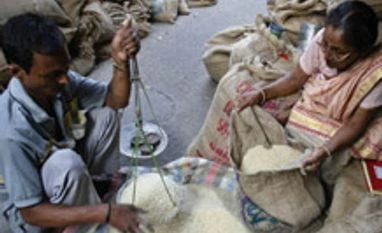The big debate that surrounds the Bill is on the financial implications as and when all the states in the country start implementing the Bill.
In the 2013-14 Union Budget, the government pegged food subsidy at Rs 90,000 crore. Within this, Rs 80,000 crore was usual food subsidy, while Rs 10,000 crore was expenses for the Food Security Bill.
Also Read
The actual food subsidy based on 2001 census data is being pegged at around Rs 1,09,000 crore, almost Rs 20,000 crore more than estimated subsidy in the Budget for 2013-14. But, this is not which is something unusual. Officials said the budget always estimates food subsidy less than actual needs, which are later either met through supplementary or rolled over to the next year.
“Never, the entire food subsidy requirement for a year is provided in the Budget. Usually 80-85% of the annual subsidy incurred in a year is released through budgetary support, while the rest is carried forward,” the official said.
The current targeted public distribution system (TPDS) is based on 2001 census, while a new census on 2011 population is already ready, which will push up the requirement of food from states as number of the poor would actually rise.
As per official estimates, the subsidy on providing cheap food will also increase to around Rs 1,13,000 crore as the number of beneficiaries rise.
This does not include subsidies, incurred on providing cheap food through mid-day meal, to pregnant women which are clubbed under the Other Welfare Schemes (OWS). Expenditure on such programmes is around Rs 8,000 crore. Thereby, the total expenditure on providing cheap food to all under the existing TPDS mechanism is estimated to be around Rs 120,000 crore.
Officials said after the Food Bill comes into force, this expenditure will swell to around Rs 130,000 crore, which also includes the expenditure incurred for OWS as these will now be part of the Bill. This expenditure of Rs 130,000 crore is for one-year and that too when all the states in the country simultaneously implement the Bill.
However, with just 4-5 states planning to implement the Bill in 2013-14 and the rest pushing it to 2014-15, there is every possibility that the entire expenditure might not come this year and government could manage to keep the food subsidy within reasonable levels.
But, what happens in 2014-15 financial year is a big question mark that has bothered all and rattled the market. A clause in the Bill fixes the sale price of wheat, rice and coarse cereals for three years at Rs 3 per kg for rice, Rs 2 per kg for wheat and Rs 1 per kg for coarse cereals.
However, the MSP or procurement price of wheat, rice and coarse cereals will have to be increased by minimum 5-10% to compensate farmers. Even if grain procurement remains at current levels of 60-62 million tonnes, the cost will increase as proposed sale price is just half of the current sale price and that to more number of people.
At present, foodgrains at Rs 3,2 1 a kg of rice, wheat and coarse cereals are just limited to 13 crore people, after the Bill it will be given to almost 80 crore people.
This is where the real trouble will start. Also from 2014-15 financial year, the Centre will be bearing a part of expenditure of all the states on transportation, storage and distribution of grains under the Food Bill, which will further add to its operational expenditure. Probably, this is what the market is fearing… a bloated incremental cost from 2014-15 onwards.
| Food Subsidy For 2013-14 as given in Union Budget | Rs 90,000 crore |
| Food Subsidy For 2013-14 on the 2001 census basis | Rs 109,000 crore |
| Food Subsidy For 2013-14 on the 2011 Census basis | Rs 113,000 crore |
| Food Subsidy, according to Food Security Bill - | Rs 130,000 crore* |
| *The Food Security Bill Is Based On 2011 Census Covering More People | |
| Source: Department of Agriculture | |
)